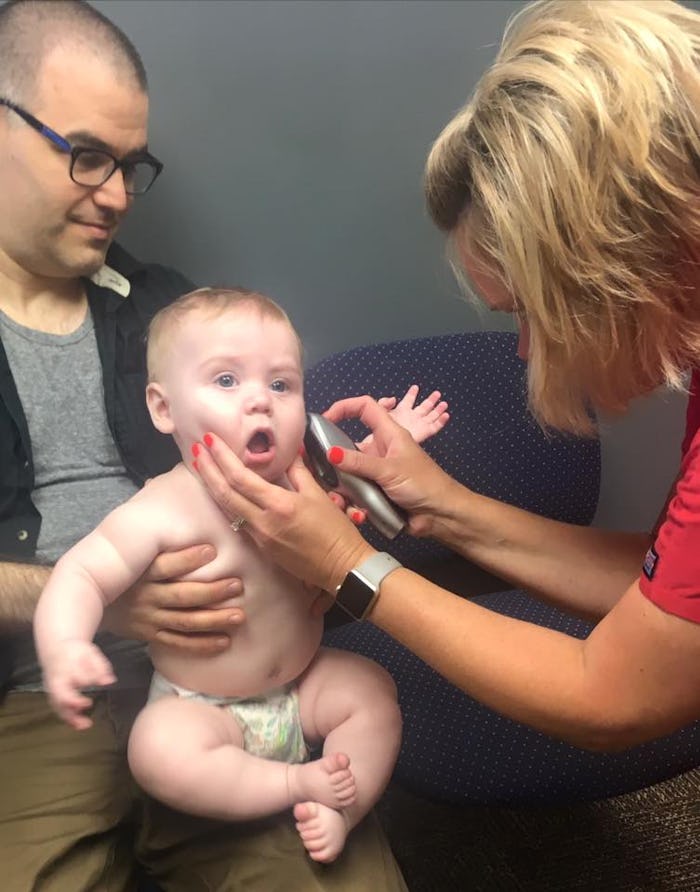Life

8 Signs Your Kid Might Have A Hearing Impairment, According To Experts
For most babies and young children, the sound of their parents' voices is a major source of calm and comfort. Kids with hearing loss experience the world differently, though, which can impact their development. Fortunately for parents, there signs your kid might have a hearing impairment that you can look out for, so you can get them the help they need to treat their hearing loss or help them navigate the world with different abilities.
According to the Centers for Disease Control and Prevention (CDC), hearing loss can happen at any time in your life. However, because your child's brain, speech, and social development can be impacted by their ability to hear, it's important to identify hearing problems as early as possible. According to Babysfirsttest.org, as many as three in 1,000 babies born in the U.S. have some degree of hearing loss, which is why they recommend all babies receive a hearing screening within 24 hours after birth.
Even if a baby passes their newborn screening, according to the American Academy of Pediatrics (AAP), they can still have or develop hearing loss later, due to an infection or injury. So, it's important that you pay attention to how they interact with you and, specifically, the things you say. If your baby seems to not notice you are there until you come into view, or your toddler doesn't seem to listen when you call their name, it might be a sign of hearing loss. The same site notes that if you think your child has hearing loss you should call their doctor as soon as possible. For many kids with hearing loss, treatments are available that can help your child hear and/or develop language skills, including hearing aids, tubes, and cochlear implants. And for children with untreatable hearing loss, it's important that they access services early on to learn to communicate with their world without sound.
They Don't Pass A Hearing Screening
According to Babysfirsttest.org, your baby will probably receive a newborn hearing screening within 24 hours after they are born. This test is super important, because your baby's speech and social development can be significantly impacted by how well they can hear. The same site notes that not passing this screening (which happens for about two to 10 percent of babies) doesn't necessarily mean your baby has hearing loss. Your baby's results might be impacted by other factors, including fluid in their ears or crying during the screening. They will need to see specialist called an audiologist for follow-up testing to determine if they have hearing loss.
They Don't Startle Easily
The AAP notes that most babies startle when they hear loud noises. So if your baby doesn't seem to notice noises, shows a startle reflex in response to sound by 1 month of age, or turns their head to find the source of sounds by 3 to 4 months of age, they might have trouble hearing.
They Don't Respond When You Call Their Name
According to the AAP, your kids not coming when you call their name is often mistaken for them not listening or being willful. However, it might also very well be a sign of hearing loss, which means if it's continually a problem it's worth a call to the doctor.
They Make Sounds They Can Feel
According to the AAP, babies with hearing loss often make sounds they can feel (like blowing raspberries), versus sounds they can hear, like vowels and consonants. If you notice your baby isn't practicing words, it's worth asking your doctor to test their hearing.
They Are Slow To Sit Or Walk Unassisted
According to the AAP, there are two main types of hearing loss: conductive hearing loss, which is caused by the ear's structure or fluid blocking sounds, and sensorineural hearing loss, which is caused by inner ear or nerve problems preventing nerves from carrying sounds to their brain. One surprising sign of the latter is difficulty sitting or walking, as the inner ear impacts balance, too.
They Don't Say Words By Their First Birthday
Because your baby's ability to hear impacts their ability to understand language and develop the ability to speak, according to the CDC, one sign of hearing loss is not being able to say basic words like mama or dada by their first birthday. While all children develop language at different rates, it's important to schedule a hearing screening right away if your 1-year-old doesn't say any words.
They Seem To Hear Some Sounds, But Not Others
According to the AAP, hearing loss can involve some sounds and not others, one or both ears. If your child seems to hear fine when you are on one side of them, or responds to lower pitched noises but not high-pitched noises, they might have partial hearing loss.
They Don't Follow Directions
As most parents can tell you, toddlers and older kids are notoriously bad at following directions. As the CDC notes, this isn't always just a sign that they aren't paying attention to you. It can also be a sign that they literally can't hear everything you say. This is why it's important that your child's doctor test their hearing if you are concerned and, at the very least, they receive a hearing screening before they start school.